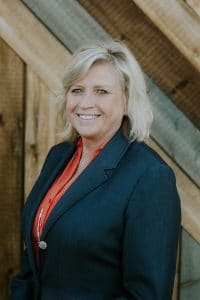Alicia Cramer, Senior Vice President , U.S. Endowment for Forestry & Communities
, U.S. Endowment for Forestry & Communities
As Senior Vice President at the Endowment, Alicia’s primary focus is program oversight and development. She began working with the Endowment first in 2015 as a volunteer member of the Board of Directors and then transitioned to become a full-time member of the leadership team in 2017. Her more than 30 years of professional experience includes roles in packaging engineering and supply chain analysis to product development positions in the forestry sector, all of which contribute to her current role.
Before joining the Endowment, Alicia worked for more than two decades for the Westervelt Company, formerly known as Gulf States Paper Corporation, located in Alabama. There she held key management positions in product development before progressing to Vice President of Business Development, an executive role that encompassed global leadership accountability for Westervelt Ecological Services, Westervelt Renewable Energy, and the company’s recreation and agricultural assets in New Zealand.
Alicia received bachelor’s degrees in Chemistry and Sociology from Thiel College in Greenville, Pennsylvania. She also completed The Fuqua School Executive program at Duke University. Most importantly, she loves to hike, fish, and spend time with her family.
In October 2019, Alicia begins sharing her talent in yet another important role as a founding member of the Tribune Steering Committee. Following is a recent conversation we had with Alicia that highlights her passion for rural America and invites an understanding of how her unique perspective will enhance the Tribune’s future. On behalf of Incourage, Tribune and the central Wisconsin region, welcome Alicia:
What aspect of the Tribune project most inspired you to become involved as a founding member of the Steering Committee? And why?
My interest and passion for rural America and forest reliant communities inspired me to become involved as a founding member of the Steering Committee. This passion came from growing up in rural Pennsylvania, which is heavily dependent on natural resources such as forests and water for economic development and recreation.
What priority opportunities do you see for the project at this moment in time?
The priorities I see for this project involve fostering innovation to help create regional markets which will require out of the box thinking and evolving with the changing times.
At the end of your first year as a founding member of the Steering Committee, what will success look and feel like for the Tribune (and also perhaps, this region, and all the people who enjoy it)?
Success will be demonstrated by creating new Market(s) that include wood fiber or fiber based materials or other natural resources in the region. This will result in job creation, improved water quality, and recreational opportunities for those who live and play there.
What do you hope the Tribune will inspire in others?
I hope the project points to tangible examples that demonstrate reinvention is possible and provides hope for communities in need.
How would you describe the 21st century pulp, paper, timber and forest products industry? What opportunities exist for the industry nationally?
The turn of the century brought a decline in manufacturing jobs dependent on wood and wood fiber, as much of it went offshore. This resulted in many forest-reliant communities feeling hopeless and victimized. Ideally as we look ahead, the forest products industry will not require the same level of dependency on traditional mills. Communities, government, and industry need innovative approaches to create new opportunities that steward our natural resources while creating market based solutions. In short, we need to sustainably manage our forests for future generations while supporting the economic development of wood based markets.
Do those same opportunities exist in the central Wisconsin region? And, what role do you see the Tribune playing in the 21st century pulp & paper industry?
Yes, the same opportunities exist in the central Wisconsin region and we hope to be able to show scalability to other regions in the country. The role of the Tribune will be to connect partners and to start the conversation of what innovation might look like for the region.
Paper is vitally important in so many areas of life. What was the last paperback book you enjoyed and were there lessons shared within you’d like to pass along?
The last paperback I read was “The Source” by M. Doyle discussing how rivers made America and how America has remade its rivers. The author creates a sense of awareness around the role that natural resources played in our history as a nation. It highlights tensions that have surfaced during the past centuries as a result of borrowing from the future to fix today’s issues including the role our federal government has played.
Anything else you’d care to share?
In order for us to evolve our thinking around the role natural resources play in our future, we must be willing to set aside what we think is true and look for ways to explore new truths.
We’d love to
hear from you.